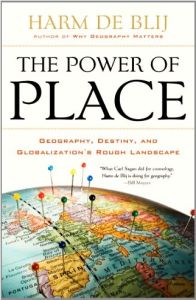Join getAbstract to access the summary!

Join getAbstract to access the summary!
Harm de Blij
The Power of Place
Geography, Destiny, and Globalization's Rough Landscape
Oxford UP, 2010
What's inside?
What “where” means and why: How birthplace shapes human destiny.
Recommendation
Harm De Blij, a geographer and a philosopher, is passionate about how place shapes a person’s destiny. He parses statistics to fill in details that maps only hint at telling. He employs rich demographic information to illustrate his thesis about the makeup of the current and future Earth. While some of his conclusions are revelatory and might change the way you think and act regarding certain world phenomena, others seem a bit obvious. The book ping-pongs between mind-blowing insights and yesterday’s news. Despite its hills and valleys, it provides a fascinating new take on the world, how it has changed, and how it will change or not. getAbstract recommends De Blij’s worldview to political scientists, investors, health care practitioners, nongovernmental organizations, those who love to collate data, and those who love to study maps and see what revelations lurk within their folds.
Summary
About the Author
Harm de Blij is the author of Why Geography Matters.
















Comment on this summary